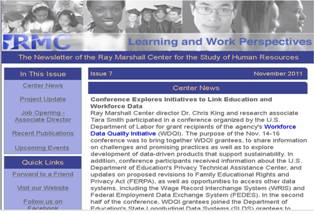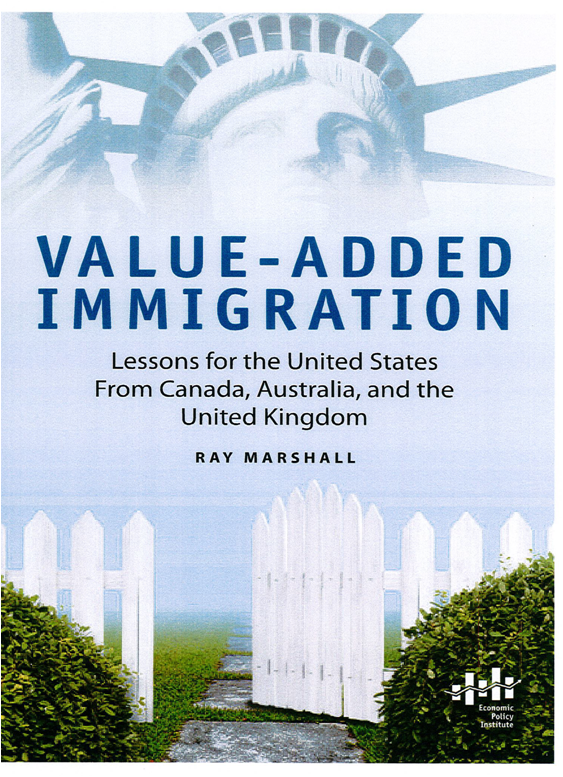The November issue of the Ray Marshall Center newsletter has been released. A copy of the newsletter can be viewed by clicking here. 
King and Smith Attend WDQI Conference
Dr. Chris King, director of the Ray Marshall Center and Tara Smith, Center research associate attended a Workforce Data Quality Initiative conference held in Arlington, VA November 14-16. In 2010, the U.S. Department of Labor’s Employment and Training Administration provided $12.2 million in funding to 13 states to expand and improve longitudinal databases of workforce data that also link to education data and support state-level initiatives to use these longitudinal databases to conduct research and analysis aimed at pinpointing the effectiveness of employment and training programs in order to better inform workforce system customers. As part of this new program, the Labor Department awarded almost $1 million to the Texas Workforce Commission (TWC). TWC partnered with the Ray Marshall Center to implement the Workforce Data Quality Initiative in Texas.
The initiative is nearing the completion of its first year. The purpose of the conference was to bring together WDQI grantees, to share information on challenges and promising practices as well as to explore “creating data-driven products to support sustainability.” In addition, grantees received information about the U.S. Department of Education’s Privacy Technical Assistance Center, and updates on proposed revisions to FERPA, as well as opportunities to access other data systems, such as the Wage Record Interchange System (WRIS) and Federal Employment Data Exchange System (FEDES). In the second half of the conference, WDQI grantees joined the Department of Education’s State Longitudinal Data Systems (SLDS) grantees to explore opportunities for linking the two initiatives.
Joining King and Smith at the conference were Texas Workforce Commission representatives Ruben Garcia and Grady Giffin. A project overview of the Texas Workforce Data Quality Initiative is available here.
RMC Provides Student Surveys Update to CREST
On Nov. 14, Greg Cumpton, research associate at the Ray Marshall Center, met with members of the Austin Chamber of Commerce’s College Readiness and Enrollment Team to present initial findings from a survey of seniors conducted in spring 2011. The senior surveys consisted of responses from over 6,000 students from ten area high schools. Garry Davis, graduate research assistant the David Fellow, developed the survey report and created the presentation, which is available at this link.
Key findings include:
- Respondents are mainly going to their counselors to discuss academic performance graduation plans
- Almost 90% of respondents reported taking a college entrance exam before they graduated
- Over half of the respondents reported submitting a financial aid application from January to June of their senior year
- In comparison to the class before them, the 2011 seniors
- More respondents are taking a college entrance exam during their junior year.
- Black, Hispanic and low-income respondents posted the highest percentage point increase, with more Black and Hispanic respondents reported completed college applications or the Texas Common Application.
- More Black and White respondents reported applying for financial aid.
Vanessa Morales Joins Research Team
The Ray Marshall Center welcomed Vanessa Morales as a new research associate. Morales is working on the Texas Early Childhood Needs Assessment project with principal investigator and senior research scientist Deanna Schexnayder. The Early Childhood Needs Assessment will seek to identify and analyze Texas’ early childhood education and school-age system and provide recommendations for meeting identified gaps in services and programs.
Morales is a doctoral candidate at the Lyndon B. Johnson School of Public Affairs at the University of Texas at Austion. Prior to joining the Ray Marshall Center, Morales worked at the Texas Education Agency and various organizations in Austin.
UPCOMING EVENT: Ray Marshall Center Co-Hosts Brown Bag Program on Local Workforce Innovations
Please join the Ray Marshall Center and the Social, Health, and Economic Policymakers (SHEP) on Nov. 10 for a brown bag lunch and discussion entitled “Local Workforce Innovations.” The event will be held at the LBJ School of Public Affairs, Room SRH 3.124 from 12:45 – 1:45PM. Lunch will be provided. The event is open to the public but attendees are requested to RSVP below.
There will be two guest speakers from local workforce development programs. Maile Broccoli-Hickey, the Executive Director for English @ Work, and Steve Jackobs, the Executive Director for Capital IDEA, will be presenting on their innovative programs and leading a discussion on issues pertaining to workforce innovations in Austin. Please see the speaker bios below for additional information.
To RSVP for the event, please visit this link: http://www.facebook.com/event.php?eid=236212849772738&context=create  Maile Broccoli-Hickey has been involved in immigrant services in Houston and Austin for over 13 years. Maile graduated from the LBJ School in 2006, before the building and course offerings were updated to their current, cutting-edge state. This probably explains why she couldn’t find a real job and had to go to work in the nonprofit sector. Maile’s research focused on adult language acquisition and immigrant rights. She also draws on the education she received as a secretary, food service, and factory employee in her work supporting Texas’ immigrant community. Maile is the founder and executive director of ENGLISH @ WORK. ENGLISH @ WORK was built on the belief that language proficiency can raise families out of poverty. The organization sends paid instructors into workplaces to provide customized language instruction to immigrant employees on site. Since 2005, ENGLISH @ WORK has helped 500 students at over 30 Central Texas employees gain the language skills they need to advance at work and improve their families’ quality of life.
Maile Broccoli-Hickey has been involved in immigrant services in Houston and Austin for over 13 years. Maile graduated from the LBJ School in 2006, before the building and course offerings were updated to their current, cutting-edge state. This probably explains why she couldn’t find a real job and had to go to work in the nonprofit sector. Maile’s research focused on adult language acquisition and immigrant rights. She also draws on the education she received as a secretary, food service, and factory employee in her work supporting Texas’ immigrant community. Maile is the founder and executive director of ENGLISH @ WORK. ENGLISH @ WORK was built on the belief that language proficiency can raise families out of poverty. The organization sends paid instructors into workplaces to provide customized language instruction to immigrant employees on site. Since 2005, ENGLISH @ WORK has helped 500 students at over 30 Central Texas employees gain the language skills they need to advance at work and improve their families’ quality of life.
 Steve Jackobs has been Executive Director of Capital IDEA in Central Texas since its founding in 1998. Capital IDEA helps low-earning adults enter high-paying careers by supporting their career education at community colleges. Previously he worked for 10 years with the Texas Industrial Areas Foundation and Austin Interfaith on initiatives and public policy of interest to low-income families, including public education, housing, water and sewer infrastructure, and workforce development. He holds a Master’s degree in Social and Political Thought from the University of Sussex in England and a Bachelor’s degree in Social Studies from Harvard University. Steve was recognized by Ernst & Young as its 2007 Social Entrepreneur of the Year and Capital IDEA has received numerous recognitions.
Steve Jackobs has been Executive Director of Capital IDEA in Central Texas since its founding in 1998. Capital IDEA helps low-earning adults enter high-paying careers by supporting their career education at community colleges. Previously he worked for 10 years with the Texas Industrial Areas Foundation and Austin Interfaith on initiatives and public policy of interest to low-income families, including public education, housing, water and sewer infrastructure, and workforce development. He holds a Master’s degree in Social and Political Thought from the University of Sussex in England and a Bachelor’s degree in Social Studies from Harvard University. Steve was recognized by Ernst & Young as its 2007 Social Entrepreneur of the Year and Capital IDEA has received numerous recognitions.
Journal Reviews Report Coauthored by Marshall Center Researchers
The November 7 issue of the Employment and Training Reporter features a piece by Cecilio Morales reviewing the recently released report by the John H. Heldrich Center for Workforce Development titled “Identifying Gaps and Setting Priorities for Employment and Training Research,” coauthored by Carl Van Horn, director of the Heldrich Center, Chris King, director of the Ray Marshall Center for the Study of Human Resources at the University of Texas at Austin, and Tara Smith, research associate at the Marshall Center. The report authors review workforce programs funded by federal agencies, related research and evaluation projects, and offer recommendations for priority research topics over the next five years.
The Employment and Training Reporter (ETR) has been providing coverage of employment programs, policies, and issues since 1969. ETR covers the whole range of U.S. federal, state and local programs, including the Workforce Investment Act, community and technical career colleges, economic development, Older Americans Act, Perkins vocational education, TANF and welfare reform, as well as vocational rehabilitation and employment for the disabled. Stories include notification on legislation and regulations, coverage of best practices and emerging policies, summaries of leading research findings, and key statistical and fiscal data.
- To view the piece in the Employment and Training Reporter, click here.
- To view a copy of the full report, click on the link: Identifying Gaps and Setting Priorities for Employment and Training Research
EPI Produces Tribute Video in honor of Dr. Ray Marshall
The Economic Policy Institute (EPI) hosted its 25th anniversary dinner event last Tuesday honoring Ray Marshall, former Secretary of Labor and one of EPI’s original founders, and Nobel Prize-winning economist Paul Krugman. EPI created a video in tribute to Ray Marshall which can be viewed below, or by clicking here. Other videos and photos from the 25th anniversary event are available at this link.
{youtube}CHp5tgK1usI{/youtube}
EPI published the following news announcement today summarizing highlights from the event:
On Tuesday, November 1, the Economic Policy Institute celebrated its 25th anniversary of working for America’s workers. At the dinner, EPI presented awards to former Secretary of Labor and EPI co-founder Ray Marshall, Wisconsin labor leaders Kim Hoffman and Mahlon Mitchell, and Nobel Memorial Prize Winner and New York Times columnist Paul Krugman.
 With over 400 guests, the event also welcomed numerous members of Congress, including Sen. Tom Harkin (D-IA), Rep. Peter Welch (D-VT), Rep. George Miller (D-CA), Rep. Keith Ellison (D-MI), Rep. Sander Levin (D-MI), and former Congressman David Obey (D-WI). Respected labor leaders were in attendance as well, including former International President of the United Steelworkers (USW) Lynn Williams, current USW President Leo Gerard, and SEIU President Mary Kay Henry. Also attending were representatives from the Ford Foundation, Public Welfare Foundation, Pete Peterson Foundation, Russell Sage Foundation, and the HJW Foundation.
With over 400 guests, the event also welcomed numerous members of Congress, including Sen. Tom Harkin (D-IA), Rep. Peter Welch (D-VT), Rep. George Miller (D-CA), Rep. Keith Ellison (D-MI), Rep. Sander Levin (D-MI), and former Congressman David Obey (D-WI). Respected labor leaders were in attendance as well, including former International President of the United Steelworkers (USW) Lynn Williams, current USW President Leo Gerard, and SEIU President Mary Kay Henry. Also attending were representatives from the Ford Foundation, Public Welfare Foundation, Pete Peterson Foundation, Russell Sage Foundation, and the HJW Foundation.
Upon receiving EPI’s first ever Distinguished Economist Award, Paul Krugman said, “EPI is scholarship on behalf of truth, justice, and a decent country for all of its citizens.” During the event, EPI also premiered the short video, “EPI at 25: Working for People Who Work for a Living.” Featuring a number of noted economists and policymakers, EPI at 25 provides a glimpse into EPI’s history of championing policies for working people. Watch EPI at 25, Paul Krugman: An Indispensable Man, and more highlights from Tuesday’s celebration.
Heldrich Center Issues Press Release on New Report Co-authored by Chris King and Tara Smith
On Oct. 31, the John J. Heldrich Center for Workforce Development at Rutgers, the State University of New Jersey, issued a press release discussing a new national study titled Identifying Gaps and Setting Priorities for Employmentand Training Research. The study, co-authored by Heldrich Center director Dr. Carl Van Horn and Dr. Chris King and Tara Smith from the Ray Marshall Center, recommends priorities for workforce development research that will contribute to better policies and programs that prepare the nation’s workforce and help the unemployed return to work. A copy of the press release is shown below and is also available for download at this link.
October 31, 2011
For Immediate Release
Toward a New Agenda for Employment & Training Research
Workforce Experts Seek More Timely Research, More Effective Dissemination of Promising Practices
A new national study entitled Identifying Gaps and Setting Priorities for Employment and Training Research has been released by the John J. Heldrich Center for Workforce Development at Rutgers, The State University of New Jersey. The 125-page report, prepared with support from a grant by the U.S. Department of Labor’s (USDOL) Employment and Training Administration (ETA), recommends priorities for workforce development research that will contribute to better policies and programs that prepare the nation’s workforce and help the unemployed return to work.
The report was co-authored by Carl Van Horn, Professor of Public Policy and Director of the Heldrich Center and by Christopher King, Director, and Tara Smith, Research Associate at the Ray Marshall Center for the Study of Human Resources at the University of Texas at Austin’s LBJ School of Public Affairs. Maria Heidkamp of the Heldrich Center also contributed research for the report.
The highest priority research topic areas include:
Understanding Changing Labor Markets. ETA should support more research on understanding the changing dynamics of labor markets and the program and service needs that result from them, rather than simply conducting more program-specific studies.
Identifying Effective Strategies. ETA needs to fund more research topics geared to the needs of the overall workforce system, such as the economic impact of Unemployment Insurance; the effectiveness of various training options; the value of credentials, training certifications, and apprenticeships in the labor market; strategies for teaching adult education through contextualized learning; and the value of workforce sectoral strategies.
Improving Workforce System Infrastructure. ETA should conduct research into the effectiveness of waivers in allowing states and local areas the flexibility to manage their workforce systems based on local circumstances, and new ways to disseminate promising practices.
Addressing the Needs of Special Populations, such as long-term unemployed workers, dislocated workers, youth and older workers, low-wage workers, exoffenders, English-language learners, persons with disabilities, and veterans. More research is needed into special strategies for effectively serving low-skill, disconnected men, Native Americans, Hispanics, and other immigrant populations.
Building Research Infrastructure and Support. Overall, ETA should improve access, use, and confidentiality of administrative records for research and evaluation, and create and distribute more public-use datasets for analysis. There is also a need to better understand the relationship between education and workforce systems, and the outcomes and impacts associated with coordination between these systems, particularly for low-skill, low-wage populations and dislocated workers.“
A number of the stakeholders and panelists said that the quality of ETA’s research in general has improved, but that more rigorous evaluation research is needed to enable, as one panelist put it, ‘more evidence-based and less belief-based policymaking,’” remarked co-author Carl Van Horn. “Workforce development research needs to focus more on assessing strategies that might improve wages and that address fundamental labor market challenges and less on specific programs.”
Among the report’s other findings:
- Access to and dissemination of ETA-funded research has increased in the past few years, but is still in need of further improvement. ETA should pool resources and seek closer collaboration between state and federal agencies, and, where feasible, with private foundations.<
- Congress and the Executive Branch should establish a Workforce Development Institute at USDOL/ETA to set research priorities, administer funding and evaluation initiatives, and disseminate results.
- The dissemination and use of federal research would be improved by reestablishing the interdisciplinary regional network of academic research,training, and technical assistance centers that existed in the 1970s and 1980s.
“There was broad consensus among the experts we consulted about the great need for larger, more strategic investments in workforce development research by USDOL/ETA, the federal agencies, and private foundations,” observed co-author Chris King. “There was also considerable agreement on the broad research topics that should receive top priority in the next five years.”
The new report’s conclusions and recommendations were developed through:
- A survey of 665 stakeholders representing state and local workforce agencies, professional and labor associations, and community organizations;
- Interviews and meetings with a 20-member National Expert Advisory Panel;
- Interviews with USDOL senior staff in Washington, D.C., as well as ETA’s national and regional offices; and
- An extensive literature review of employment and training-related research conducted (since 2005) with the support of the U.S. Departments of Labor, Health and Human Services, Education, Commerce, Housing and Urban Development, and Energy; Social Security Administration; National Science Foundation and other federal agencies; several state and local governments; as well as efforts supported recently by major foundations, including the Annie E.Casey Foundation, the Bill and Melinda Gates Foundation, the Ford Foundation, the Joyce Foundation, and the Charles Stewart Mott Foundation.
The research published during this timeframe included demonstrations and analyses for specific populations of workers (e.g., youth, low-wage, immigrants, ex-offenders, unemployed individuals, older), as well as evaluations of services, training, and support strategies within the workforce development system.
“Given the major challenges facing the U.S. economy and workforce,” Dr. Van Horn concluded, “it is imperative that federal, state, and local workforce policymakers and practitioners have access to rigorous, timely, and credible research about the programs and strategies that are most effective in helping American job seekers obtain employment and advance their careers.”
The Employment and Training Administration has just released a draft of its next Five-Year Research and Evaluation Strategic Plan, which is required under the Workforce Investment Act. (See: Federal Register Volume 76, # 209, Friday, October 28, 2011, http://webapps.dol.gov/FederalRegister//HtmlDisplay.aspx?DocId=25434&AgencyId=15&DocumentType=3 ). According to the Notice, the Heldrich Center’s report was “acritical source for the Research Plan, and information from the paper was adopted ascore parts” of several chapters and appendices.
ETA also commented on the “extensive effort” that was made by the Heldrich Center“ to engage both internal and external stakeholders in the process of identifying research gaps and high priority topics for the public workforce system.”
The John J. Heldrich Center for Workforce Development is based at the Edward J. Bloustein School of Planning and Public Policy at Rutgers University. It is one of the nation’s leading university-based research and policy centers dedicated to raising the effectiveness of the American workplace through improved workforce education, placement, and training. The Center identifies innovative workforce practices and practical policy changes that can help Americans receive the education and training they need to be productive and prosperous in a global knowledge economy. Learn more at http://www.heldrich.rutgers.edu
The Ray Marshall Center is based at the LBJ School of Public Affairs at the University of Texas at Austin. It is a university-based research center dedicated to strengthening education, workforce, and social policies and programs that affect current and future generations of American workers. The Center seeks to translate its research into effective policies and programs through Program Evaluation; Survey Research; Labor Market Analysis; Program Design and Development; and Training and Technical assistance. For more information, visit https://sites.utexas.edu/raymarshallcenter.
EPI Celebrates 25th Anniversary Tonight
 The Economic Policy Institute (EPI) celebrates its 25th anniversary tonight with a special dinner event in honor of Ray Marshall, former Secretary of Labor and one of EPI’s original founders from 1986, and Paul Krugman, Nobel Prize winning economist and op-ed columnist for the New York Times. The evening’s theme is “Putting Working Families First” and includes a special program to recognize EPI’s tireless efforts to champion American workers and their families.
The Economic Policy Institute (EPI) celebrates its 25th anniversary tonight with a special dinner event in honor of Ray Marshall, former Secretary of Labor and one of EPI’s original founders from 1986, and Paul Krugman, Nobel Prize winning economist and op-ed columnist for the New York Times. The evening’s theme is “Putting Working Families First” and includes a special program to recognize EPI’s tireless efforts to champion American workers and their families.
For more event details, visit EPI’s event page at this link or call 202-775-8810.
Economic Policy Instiute Hosts Dr. Ray Marshall and Panel Discussion of His New Book
 Dr. Ray Marshall, former U.S. Secretary of Labor and founder of the Ray Marshall Center for the Study of Human Resources, discusses his new book Value-Added Immigration: Lessons for the United States From Canada, Australia, and the United Kingdom in a panel discussion and book signing event hosted by the Economic Policy Institute (EPI) today in Washington DC. Invited panelists include Philip Martin, professor from the University of California in Davis, and chair of the U.C. Comparative Immigration & Integration Program; Ron Hira, associate professor at the Rochester Institute of Technology and Research Associate at EPI; and Michael Teitelbaum, senior advisor at Alfred P. Sloan Foundation and Wertheim Fellow at the Labor Worklife Program at Harvard Law School.
Dr. Ray Marshall, former U.S. Secretary of Labor and founder of the Ray Marshall Center for the Study of Human Resources, discusses his new book Value-Added Immigration: Lessons for the United States From Canada, Australia, and the United Kingdom in a panel discussion and book signing event hosted by the Economic Policy Institute (EPI) today in Washington DC. Invited panelists include Philip Martin, professor from the University of California in Davis, and chair of the U.C. Comparative Immigration & Integration Program; Ron Hira, associate professor at the Rochester Institute of Technology and Research Associate at EPI; and Michael Teitelbaum, senior advisor at Alfred P. Sloan Foundation and Wertheim Fellow at the Labor Worklife Program at Harvard Law School.
In this new volume, Dr. Marshall explores employment-based immigration policies from Canada, Australia, the United Kingdom and the United States. These four countries share similar characteristics as advanced liberal democracies as well as “immigrant nations,” meaning they are increasingly dependent on migration for their economic and social welfare. However, the United States has immigration policies that are almost universally regarded as dysfunctional while Canada, Australia, and the UK considered to have some of the world’s best-managed migration systems. Dr. Marshall analyzes and comparatively assesses the immigration systems between these countries and then drawing upon the best of what those systems have to offer, proposes general principles for effective immigration reform in the United States.
Dr. Marshall has served in two Presidential administrations; first as U.S. Secretary of Labor under the Carter administration and then as a member of the National Skills Standard Board and the Advisory Commission on Labor Development in the Clinton administration. In 1970, Dr. Marshall established the Center for the Study of Human Resources while he was teaching at the University of Texas in Austin. In 1999, the Center was renamed the Ray Marshall Center to honor his retirement from teaching at the University. Dr. Marshall presently serves as senior advisor at the Ray Marshall Center, Audre and Bernard Rapoport Centennial Professor (Emeritus) of Economics and Public Affairs at the LBJ School of Public Affairs at the University of Texas in Austin, and is a Distinguished Fellow and member of the board of directors of the Economic Policy Institute.
- « Previous Page
- 1
- …
- 32
- 33
- 34
- 35
- 36
- …
- 40
- Next Page »

